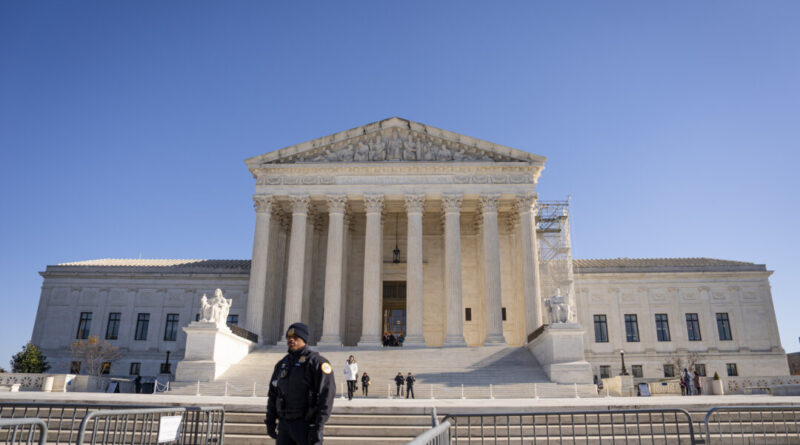Supreme Court Faces Challenges in Case Regarding Stolen Holocaust Assets
The D.C. Circuit previously determined that the Foreign Sovereign Immunities Act does not bar survivors from suing Hungary.
On December 3, the U.S. Supreme Court revisited for the second time in three years the issue of whether foreign nationals have the right to access U.S. courts for lawsuits concerning assets confiscated during the Holocaust.
During the hearing in Republic of Hungary v. Simon, the justices appeared mostly receptive to Hungary’s arguments. Alongside Hungary, the Hungarian State Railways, known as Magyar Allamvasutak Zrt., is also a petitioner in this case.
The respondents, primarily foreign nationals, initiated a proposed class action lawsuit in 2010, seeking compensation for property that was confiscated from their families during the Holocaust.
According to court documents, they allege that Hungary and its railway system seized the property in 1944 when families faced brutality and were forcibly removed from the nation under Nazi policies. The profits from the seized property “were transferred to the Hungarian government treasury and mingled with other Hungarian governmental revenues.”
As Hungary later issued bonds in the U.S. from its general fund, lower courts concluded that this connection to the United States was sufficient to grant American courts jurisdiction over the case.
The respondents contend that their ability to sue in the United States stems from the “expropriation exception” of the Foreign Sovereign Immunities Act (FSIA), a U.S. law that restricts the jurisdiction of U.S. courts over claims against foreign governments. They argue that this exception allows suits against foreign governments when property is confiscated in contravention of international law.
A federal district court dismissed the lawsuit, ruling that the arbitration process outlined in the 1947 peace treaty between the United States and Hungary needed to be observed.
In 2016, the U.S. Court of Appeals for the District of Columbia Circuit overturned the dismissal, concluding that the treaty process was not definitive for this type of litigation.
The court held that, due to the commingling of proceeds from the sale of the assets with other funds, it could be inferred “that the defendants retain the property or proceeds thereof, absent a sufficiently compelling indication to the contrary.”
Upon reconsideration of the case, the district court dismissed it again, citing that the litigants should have sought resolution outside the United States.
Once more, the D.C. Circuit reversed this decision, ruling in 2020 that the district court made an error in dismissing the case because the grounds it cited were not permissible under the FSIA.
That same year, the U.S. Court of Appeals for the Second Circuit dismissed a similar case against Germany, determining that the plaintiffs did not “trace the proceeds from property expropriated more than a century ago to present‐day property owned by Germany in New York.”
During the oral arguments on December 3, Hungary’s attorney, Joshua Glasgow, argued that Hungary and its railway cannot be sued in U.S. courts unless “some present-day asset with a commercial nexus within the United States was given in exchange for items taken from 14 individuals in 1944.”
Glasgow warned that allowing an exemption to sovereign immunity would inundate U.S. courts with foreign disputes.
“Merely demonstrating that funds entered into the general revenue of an entire nation—containing billions of dollars followed by an endless number of transactions after that deposit—simply doesn’t align with the FSIA,” he stated.
Justice Elena Kagan countered that Glasgow’s interpretation “provides foreign countries an easy way to expropriate property without facing accountability for that expropriation.”
The attorney representing the respondents, Shay Dvoretzky, asserted that Hungary and the railway forcefully seized the “respondents’ property while transporting them onto cattle cars.”
He added that Hungary and the railway sold the property and intermingled the sale proceeds with existing bank deposits. This indicated that Hungary “utilized commingled funds to pay interest and purchase equipment in the United States [and] introduced into the U.S. property acquired in exchange for the expropriated assets.”
Sopan Joshi, attorney for the U.S. Justice Department, commented that the families’ commingling argument is not “substantiated by the FSIA’s language,” which references terms like “that property,” “such property,” and “exchanged for,” all of which imply specific identifiable property and transactions.
He argued that once cash is deposited into an account with numerous withdrawals and deposits, “that money loses its distinct identity as being exchanged for the original property.”
Joshi further noted that the question is not whether Hungary acted improperly, but rather whether the dispute is appropriate for resolution in U.S. courts.
Typically, the FSIA indicates that disputes of this nature should be resolved outside of U.S. courts, albeit permitting “a slight deviation from the strict interpretation of sovereign immunity” if the foreign country or the misappropriated property has a significant connection to the United States, he explained.
Justice Samuel Alito remarked to Joshi, “I don’t comprehend your argument regarding retaliation.”
Alito questioned whether if lawsuits emerge in the United States regarding the expropriation of U.S. nationals’ property, “are foreign nations … going to consider suits based on the expropriation in their country of their nationals’ property?”
Chief Justice John Roberts addressed Dvoretzky, stating, “You are effectively requesting that we … dismiss the general principle that sovereigns cannot be sued for appropriations of this type.”
“Once you assert that commingling is sufficient grounds, well, then … everything becomes essentially permissible.”
Justice Brett Kavanaugh expressed concern that allowing this type of lawsuit “could exacerbate tensions with foreign nations.”
“It’s a significant issue to summon a foreign nation into a U.S. court, and it also elevates the risk of reciprocal measures against the United States abroad,” he remarked.
A “narrower interpretation” of the FSIA might be “more judicious,” Kavanaugh suggested.
Sam Dorman contributed to this report.




